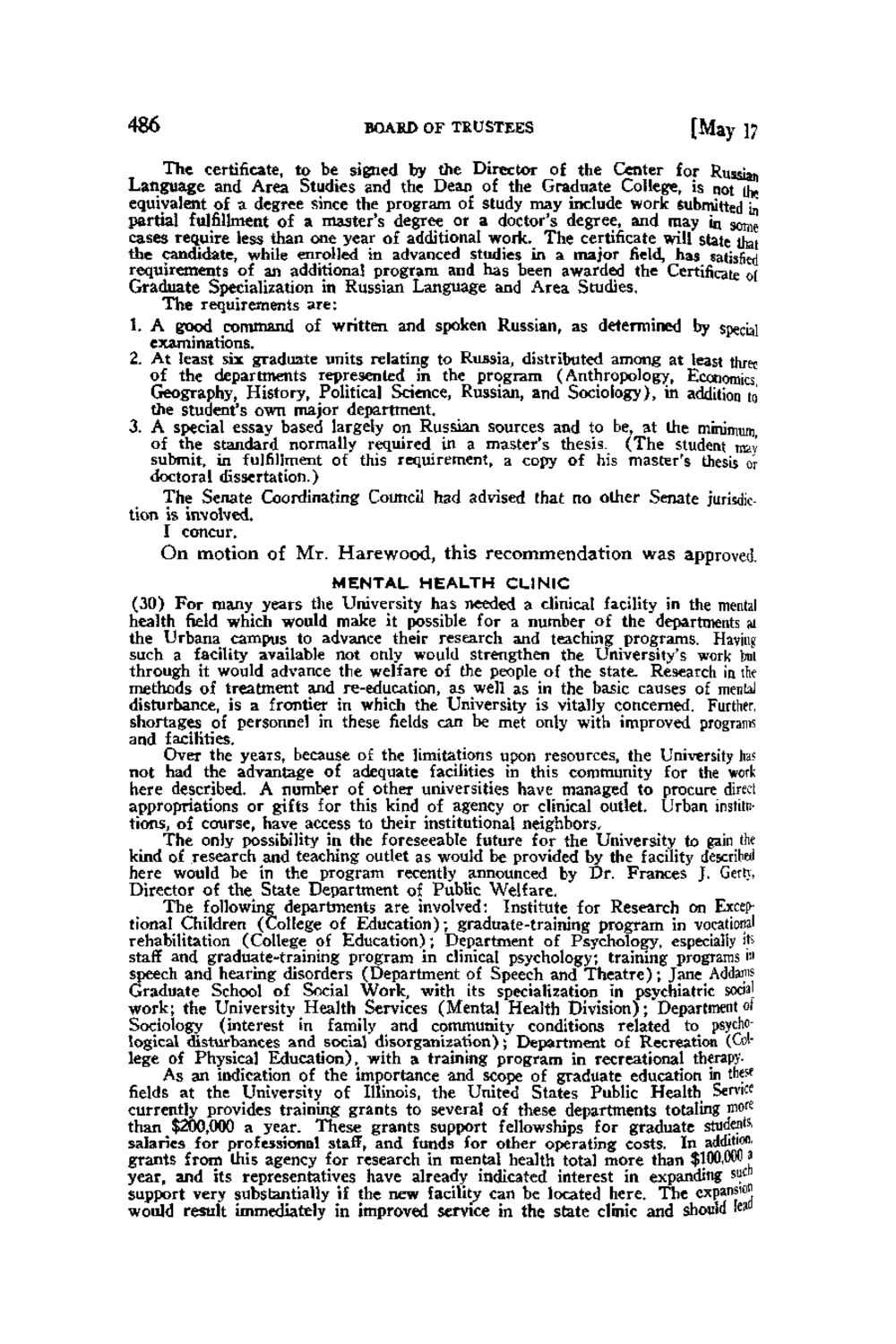| |
| |
Caption: Board of Trustees Minutes - 1962
This is a reduced-resolution page image for fast online browsing.

EXTRACTED TEXT FROM PAGE:
486 BOARD OF TRUSTEES [May 1? The certificate, to be signed by the Director of the Center for Russian Language and Area Studies and the Dean of the Graduate College, is not ih> equivalent of a degree since the program of Study may include work Submitted b partial fulfillment of a master's degree or a doctor's degree, and may in 3 ^ cases require less than one year of additional work. The certificate will state thai the candidate, while enrolled in advanced studies in a major field, has satisfied requirements of an additional program and has been awarded the Certificate o( Graduate Specialization in Russian Language and Area Studies, The requirements are: 1. A good command of written and spoken Russian, as determined by special examinations. 2. At least six graduate units relating to Russia, distributed among at least three of the departments represented in the program (Anthropology, Economics, Geography, History, Political Science, Russian, and Sociology), in addition to the student's own major department. 3. A special essay based largely on Russian sources and to be, at the minimum, of the standard normally required in a master's thesis. (The student may submit, in fulfillment of this requirement, a copy of his master's thesis or doctoral dissertation.) The Senate Coordinating Council had advised that no other Senate jurisdiction is involved. I concur. O n motion of Mr. Harewood, this recommendation was approved, MENTAL HEALTH CLINIC (30) For many years the University has needed a clinical facility in the mental health field which would make it possible for a number of the departments ai the Urbana campus to advance their research and teaching programs. Having such a facility available not only would strengthen the University's work but through it would advance the welfare of the people of the state. Research in the methods of treatment and re-education, as well as in the basic causes of meubJ disturbance, is a frontier in which the University is vitally concerned. Further, shortages of personnel in these fields can be met only with improved programs and facilities. Over the years, because of the limitations upon resources, the University ha? not had the advantage of adequate facilities in this community for the work here described. A number of other universities have managed to procure direct appropriations or gifts for this kind of agency or clinical outlet. Urban instillstions, of course, have access to their institutional neighbors. The only possibility in the foreseeable future for the University to gain the kind of research and teaching outlet as would be provided by the facility described here would be in the program recently announced by Dr. Frances J. Getty, Director of the State Department of Public Welfare. The following departments are involved: Institute for Research on Exceptional Children (College of Education); graduate-training program in vocational rehabilitation (College of Education); Department of Psychology, especially it; staff and graduate-training program in clinical psychology; training programs r< speech and hearing disorders (Department of Speech and Theatre); Jane Addams Graduate School of Social Work, with its specialization in psychiatric sooa| work; the University Health Services (Mental Health Division); Department0' Sociology (interest in family and community conditions related to psychological disturbances and social disorganization); Department of Recreation (College of Physical Education), with a training program in recreational therapyAs an indication of the importance and scope of graduate education in these fields at the University of Illinois, the United States Public Health Service currently provides training grants to several of these departments totaling more than_$2OO,OO0 a year. These grants support fellowships for graduate students, salaries for professional staff, and funds for other operating costs. In addiW1, grants from this agency for research in mental health total more than $100,000 a year, and its representatives have already indicated interest in expanding su<* support very substantially if the new facility can be located here. The expansion would result immediately in improved service in the state clinic and should M
| |